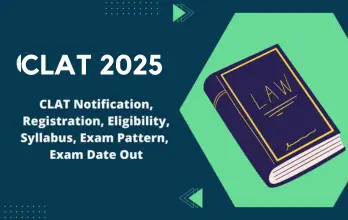
In this digital age, many motivational videos/bogs over-motivate you about CLAT being a piece of cake. They claim that CLAT is an easy and effortless exam, that anyone can pass the CLAT with minimal preparation, and that success is guaranteed with a positive attitude and a few simple tips and tricks. But they often ignore the fact that the CLAT is a challenging and competitive examination that requires a significant amount of preparation. Here in this article, we will discuss 'What you should not do while preparing' and 'Why you shouldn't prepare for CLAT'.
CLAT is a highly competitive and rigorous examination that requires extensive preparation and dedication. If you are not committed to putting in the time and effort necessary to succeed, you are likely to struggle in this examination. Indeed, with the proper preparation, you can increase your chances of getting into one of the top law schools in India, but have you really got what is needed for this examination?
CLAT is a great way to showcase your academic abilities and to demonstrate your passion for law, but it requires enormous efforts to crack. CLAT is designed to test your knowledge of the law, legal reasoning skills, as well as your ability to analyze complex legal situations and provide sound advice. If you do not have a genuine interest in pursuing a career in law, you will likely struggle with these tasks.
CLAT covers five subjects - English Language, Current affairs including General Knowledge, Legal Reasoning, Logical Reasoning and Quantitative Techniques (Maths). Each of the subjects requires certain skill sets to master them, and in the subsequent part of the article, we will see which habits you ought to make and which to avoid in order to crack CLAT 2026.
1. English Language:
It is an important part of the Common Law Admission Test (CLAT) as it assesses the candidate's comprehension and language skills. Here are some 'Don'ts' that you should remember.
- Avoiding reading and writing: One of the biggest mistakes that aspirants make is not spending enough time reading and writing in English. Improving your English skills requires consistent practice, and this can only be achieved by reading extensively and writing regularly.
- Ignoring vocabulary: Another common mistake is ignoring the importance of vocabulary in CLAT. You must focus on improving your grammar and expanding your vocabulary to perform well in CLAT.
- Not practising past papers and sample questions: Past papers and sample questions can provide valuable insights into the types of questions that you can expect in the CLAT. By practising these questions regularly, you can improve your ability to comprehend the question faster and identify the correct answer.
- Not seeking help when needed: If you are struggling with any aspect of English, it is important to seek help from a teacher, tutor, or mentor. Do not be afraid to ask for help, as this is the best way to overcome any challenges that you may face.
- Acknowledge your work: It is an important step in the process, and it is crucial to avoid errors in your work.
So if you are the one who does not like to read long paragraphs, and are not ready to work on your vocabulary and comprehension ability, then CLAT isn't for you.
2. Legal Reasoning:
Legal Reasoning is a key component of the Common Law Admission Test (CLAT). It is designed to assess the candidate's ability to understand and apply legal principles, rules, and concepts in real-life situations. Thus if you are unsure about your Legal career, then CLAT is not an option for you.
- Lack of interest in law: If you are not interested in pursuing a career in law or are not passionate about the field, preparing for CLAT might not be worth your time and effort.
- Unclear career goals: If you are unsure about your future career goals and haven't decided on law as a career path, you might want to wait before investing time and resources into preparing for CLAT.
- Avoiding the basics of Indian Law: Understanding the basics of Indian law is crucial in order to perform well in the legal reasoning section of CLAT. You must read books, articles, and case studies related to Indian law to understand the legal system more deeply.
- Not up-to-date with legal news: Staying updated with legal news can help you to keep abreast of current legal issues and developments and to understand the practical application of legal principles. So, if you are not curious about legal developments, or if Current Affairs bores you, then CLAT is not your cup of tea
Here are some positive steps you must take if you want to ace Legal Reasoning:
- Practice mock tests and sample questions: Practicing mock tests and sample questions can help you to familiarize yourself with the types of questions that you can expect in CLAT. It can also help you to identify areas where you need to improve.
- Attempt Legal Reasoning Topic Test Here Analyze legal cases: Reading and analyzing legal cases is an effective way to develop your legal reasoning skills. By analyzing legal cases, you can learn how to identify the key facts and arguments, and understand how the cases are settled
- Watch Legal Reasoning Youtube Classes: If you are struggling with legal reasoning, you can study Legal Reasoning from the pioneers of the field. They can provide valuable insights and advice on how to improve your skills.
3. Logical Reasoning:
It is an important part of the Common Law Admission Test (CLAT). It assesses the candidate's ability to solve problems and make logical conclusions based on given information. You need to avoid the following points if you want to master the Logical Reasoning Section:
- Rushing through the questions: Logical reasoning questions require time and attention to detail. So if you have a habit of jumping straight to the conclusion, you need to reconsider choosing CLAT. Refrain from rushing through the questions, as this can result in mistakes and reduce your accuracy.
- Ignoring practice and mock tests: Logical reasoning requires consistent practice and repetition to master. Do not avoid mock tests, as they are the best way to improve your skills.
- Focusing on one type of question: Logical reasoning in CLAT is a diverse section covering various question types. Avoid focusing on one type of question, as this will limit your exposure to other question types and leave you vulnerable to unfamiliar questions
- Being too confident: Being overly confident can lead to careless mistakes and reduce your accuracy. Avoid being too confident, and approach each question with a critical eye.
Logical Reasoning Classes, Syllabus and Strategy for CLAT 2026
4. Quantitative Techniques:
If you want to master Quantitative Techniques in CLAT, it is important to avoid these common mistakes. Regularly practice and attempt mock tests, use shortcuts, review mistakes, formulas and concepts regularly, and manage your time effectively. Avoid doing the following mistakes and start thinking.
- Neglecting time management: Time management is an important aspect of Quantitative Techniques in CLAT. Avoid neglecting time management, as this can result in not completing the section or not having enough time to review your answers
- Problem in Interpretating Data: If interpretation of a lot of data frightens you then you must revisit your decision because quantitative Techniques require consistent practice and repetition to master
- Over-reliance on shortcuts: While shortcuts can be useful, they should not be relied upon too heavily. Avoid over-using shortcuts, as they can lead to careless mistakes and reduce your accuracy.
- Not reviewing formulas and concepts: Reviewing formulas and concepts is important in retaining knowledge, and if you keep forgetting the formulas, then you need to rethink your decision of choosing CLAT.
5. Current Affairs:
Current Affairs is a vast and dynamic subject and thus considered as the most unpredictable subject in CLAT. It consists of static and dynamic portions, which require you to always stay up-to-date with current events. It is relevant not only for the exam but also helps in daily life. Thus, if you do not have the enthusiasm to be up to date and curiosity to know things around the world, then people CLAT isn't an easy task for you.
- Focussing on irrelevant information: If you have a thing for bollywood gossip or are more interested in political news, then my dear friend, CLAT is not an option for you. When studying for the current affairs section of CLAT, focus on relevant information that is likely to be covered in the exam. This will help you score well and achieve your desired result.
- Following Headings only: Current Affairs section in CLAT require more in-depth knowledge than just headings. So if you are using app like 'Inshorts' that covers short news, that might be harmful to you. Make a habit of reading long articles and opinions from reputable newspapers like The Hindu or The Indian Express
- Practice mock tests: Practice mock tests and sample questions regularly to improve your current affairs skills. This will help you identify areas for improvement and prepare you for the CLAT exam.
- Review past current events: Review past current events regularly to improve your overall understanding and retain information. This will help you recall important events and information when needed.
The reasons given above are just a few among many to know that CLAT is not a suitable examination for non-serious aspirants. If you are not fully committed to pursuing a career in law, it is best to avoid taking this demanding and competitive test.
Thus it is important to weigh the pros and cons of preparing for CLAT and make an informed decision based on your personal circumstances.
Apart from the many reasoning stated above, the following are some harsh truth why non-serious aspirants should stay away from CLAT:
- CLAT preparation requires a lot of dedication, hard work, and time. If you have other commitments that take up most of your time, you might want to wait until you have more free time before preparing for CLAT
- The CLAT is designed to test your knowledge of the law, comprehension skills, reading ability and overall pressure-handling performance. If you do not have a genuine interest in pursuing a career in law, you will likely struggle with these tasks.
- The CLAT is an expensive examination, both in terms of the fee and the cost of preparing for it. If you are not committed to putting in the time and effort required to succeed, you will be wasting your money and time.
- Be cautious of fake motivational videos that over-motivate you. Instead, focus on realistic and practical preparation strategies, and seek out reliable and trustworthy resources to help you succeed on this demanding exam
- Don't ignore mock tests and practice questions. It may lead to a lack of familiarity with the types of questions that you can expect in CLAT
- Don't procrastinate. It can lead to overburdening at the last-minute, which is not effective in retaining information.
- Don't ignore previous year question papers. It can give you a good idea of the types of questions that are likely to appear in the exam. Ignoring previous year question papers can lead to being caught off guard on exam day.
How to counter the problem?
CLAT exam tips can help candidates get through CAT 2019 easily if adopted with utmost sincerity. The way out is, to begin with, the basic of maths and resolve all the issues in understanding the basic concepts.
As you begin with the CLAT 2026 preparation, keep in mind that planned study fetches the best result. Hard work coupled with a neatly formulated plan for studying is the pro CLAT exam tip. Devote a decent amount of time to each section and dive into the basics first. This will automatically equip you to solve questions of complex nature.
Thanks and Regards,
Team Smartkeeda

Author : Rohit Sharma
Hi, I am Rohit Sharma, the head of the Law exams vertical at Smartkeeda and an alumnus of NLU Punjab. Having successfully cleared the CLAT exam twice, I am currently engaged in teaching Legal Reasoning on the LawEx YouTube channel. Moreover, I contribute by writing blogs that are specifically tailored to the CLAT exams.

.png)




